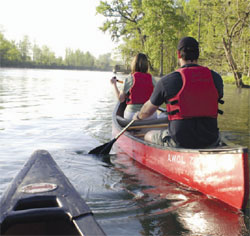
Sat, November 01, 2025 | 6:42 PM
Augusta, Georgia
Augusta is best known for hosting the Masters. Each April, as the world watches, the best golfers from around the globe challenge the venerable course at Augusta National Golf Club, vying for the distinct honor of wearing the coveted green jacket presented to the champion.
But Augusta is more than just the home of the world's most important golf tournament. It is a thriving city with a rich history and a bright future. Located in the east central section of Georgia, tucked up against the South Carolina state line, Augusta's first settlers, led by Gen. James Oglethorpe, arrived in 1736.  Named in honor of Princess Augusta of Saxe Gotha, the bride of the Prince of Wales, the city was built on the Savannah River. Its importance soared with the invention of the cotton gin in 1793 and the construction of the Augusta Canal in 1847, and the city at one time was the second largest inland cotton market in the world.
Named in honor of Princess Augusta of Saxe Gotha, the bride of the Prince of Wales, the city was built on the Savannah River. Its importance soared with the invention of the cotton gin in 1793 and the construction of the Augusta Canal in 1847, and the city at one time was the second largest inland cotton market in the world.
Augusta, the capital of Georgia from 1785 until 1795, boasts nine neighborhoods on the National Register of Historic Places. Included among its historically significant buildings are the Cotton Exchange, established in 1872; the boyhood home of U.S. President Woodrow Wilson; the Ezekiel Harris House, built in 1797; the home of George Walton, who signed the Declaration of Independence; and Springfield Baptist Church, the oldest African American church in the United States.
Augusta, the capital of Georgia from 1785 until 1795, boasts nine neighborhoods on the National Register of Historic Places.
As proud as it is of its past and its status as Georgia's second-oldest city, Augusta, also the state's second-largest city, is looking to the future. More than 1.5 million people visit Augusta each year, spending in excess of $366 million and helping to create more than 5,000 jobs. One of the city's top attractions is Riverwalk Augusta, a two-tiered park along the Savannah River that offers museums, gardens and picnic areas, and an open-air concert pavilion.
The Augusta Museum of History tells the city's story, and the Morris Museum of Art highlights the work of Southern artists. Fort Discovery, the National Science Center's interactive museum, gives visitors a close-up look at the wonders of science.
Other Riverwalk attractions include the Georgia Golf Hall of Fame's Botanical Gardens; Hero's Overlook; the Jessye Norman Amphitheater; and Springfield Village Park.
View Larger Map
